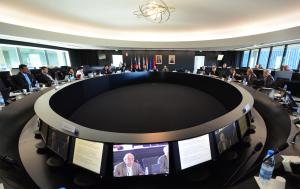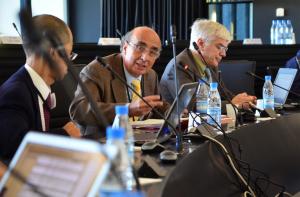Paving the way for tritium breeding
Last week, the committee in charge of the governance of the Test Blanket Module Program (TBM Program) convened at ITER Headquarters for its tenth meeting. The TBM Program Committee meets twice a year to review the implementation in ITER of these in-vessel components and their associated ancillary systems charged with testing viable techniques for the "breeding" of tritium necessary for the fuelling of future fusion power reactors. The Committee's findings are reported to the ITER Council.
The main objectives of the meeting were to verify the status of the short-term steps planned in the present ITER Baseline and to identify the actions needed to achieve them on time. The most important milestones identified were the signature of the six TBM Arrangements and the organization of Conceptual Design Reviews for the six different Test Blanket Systems, which are scheduled for the second half of 2014, or early 2015.
An important agenda item was to reach agreement on the details of the early procurement of the connection pipes for the Test Blanket System. These connection pipes belong to the six Test Blanket Systems and should therefore be procured by the relevant ITER Members. A document dealing with the administrative and financial arrangements for the procurement of those pipes has now been agreed upon and will be recommended to the ITER Council for endorsement.
The tenth TBM Program Committee noted the good progress in the design development performed by the ITER Organization and in the R&D activities carried out by all seven ITER Members. The main milestones in relation to the activities planned for 2014 and 2015 were verified and confirmed by the group.
A further item discussed was the preparation of the Radwaste Management Agreement necessary to the definition of how radwaste related to the Test Blanket Systems will be dealt with during ITER Operation and later decommissioning. In this respect, the activities to be performed by the Test Blanket Program Working Group on Radwaste Management have been clarified and addressed.
The TBM Program Committee noted the progress made in this area. However, a significant amount of work is still necessary to complete the analyses. The Program Committee charged the Test Blanket Program Working Group (TBP-WG) to define in detail all the actions needed from the disassembly of the Test Blanket Modules and the Test Blanket Systems up to their disposal; to define the models estimating tritium inventory and out-gassing and to homogenize the received data with the objective of identifying cost drivers; and to perform a preliminary estimation of the costs related to the main actions (temporary storage, transportation, and disposal).
To address the need of wider involvement on the part of the ITER Organization in the Working Group activities, the tenth TBM Program Committee nominated Jaap van der Laan as Working Group Vice-Chair.



